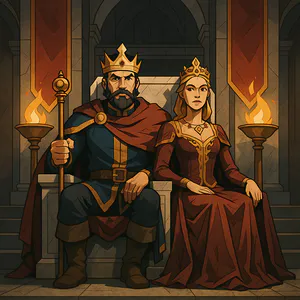Generate king and queen names
More Fantasy Name Generators- <% result.name %>
Discover all Story Shack apps
Crown Your Characters with Regal Names
Choosing the perfect name for your king or queen can elevate your storytelling. Use these thought-provoking questions to inspire unique and memorable royal titles that encapsulate your characters' essence.
- What is the ruling philosophy of your kingdom, and how does it reflect in your monarch's name?
- What legendary figures from history or mythology could influence your king or queen's name?
- What traits or virtues does your monarch embody, and how can those be captured in their name?
- What cultural elements or languages can inspire a distinct and fitting name for your royal character?
- What significant events or personal journeys could be mirrored in your monarch's name?
Frequently Asked Questions
Explore our FAQs to learn how the King and Queen Name Generator can enhance your character creation process.
How does the King and Queen Name Generator work?
It generates a variety of royal names by combining historical references, cultural nuances, and character traits with each click.
Can I specify the type of name I want for my king or queen?
Unfortunately, custom input isn't accepted, but you can regenerate names until you find one that perfectly suits your character.
Are the names truly unique?
The names are randomly generated; with unlimited clicks, you'll discover a diverse array of options, though some may have similarities.
How many names can I generate?
You can generate as many names as you like; simply click the generate button repeatedly to explore endless possibilities.
How do I save my favorite names?
You can easily copy a name by clicking on it or use the heart icon to save your favorites for future reference.
What are good king and queen names?
There's thousands of random king and queen names in this generator. Here are some samples to start:
- Sukaphaa Kvekić
- Pulcheria Gao
- Salingathu Donna
- Levan Katea
- Ye Yang
- Bertha Singha
- Helvis Ariadne
- Pingjun Maituku
- Thukomma Sevada
- Marina Thaditha
About the creator
All idea generators and writing tools on The Story Shack are carefully crafted by storyteller and developer Martin Hooijmans. During the day I work on tech solutions. In my free hours I love diving into stories, be it reading, writing, gaming, roleplaying, you name it, I probably enjoy it. The Story Shack is my way of giving back to the global storytelling community. It's a huge creative outlet where I love bringing my ideas to life. Thanks for coming by, and if you enjoyed this tool, make sure you check out a few more!


































































